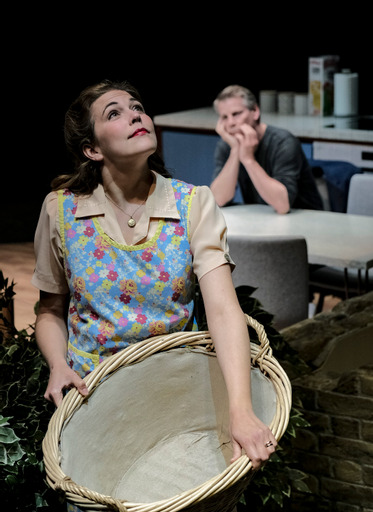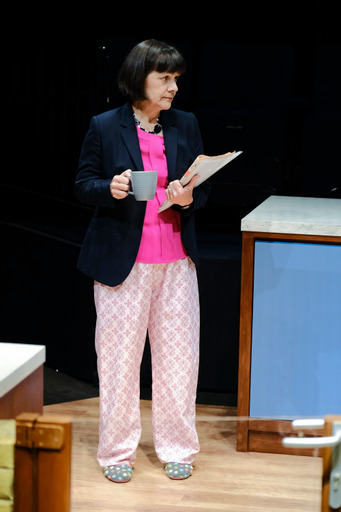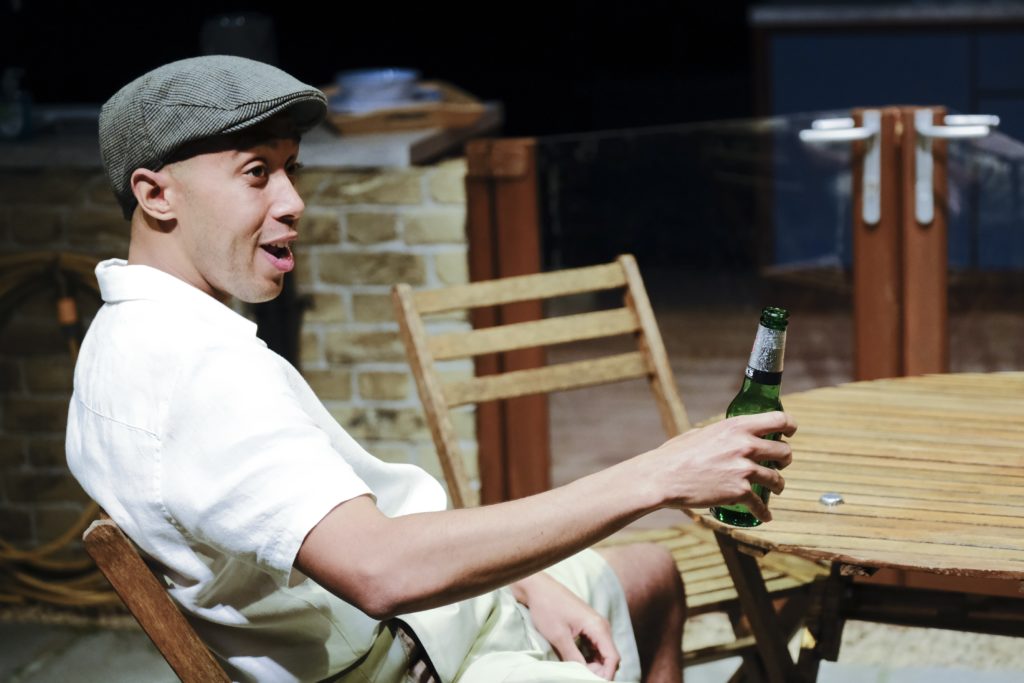
Alan Ayckbourn’s The Girl Next Door, Stephen Joseph Theatre, Scarborough, until July 3. Box office: 01723 370541 and at sjt.uk.com
WHO else but director emeritus and Scarborough knighted playwright Alan Ayckbourn could be at the helm of the Stephen Joseph Theatre’s first in-house production of 2021.
He has been chomping at the bit, as the racehorse saying goes, writing even more prolifically and recording and sound-editing two audio plays, Anno Domino and the reawakened ghost story Haunting Julia, as lockdown followed lockdown.
He has missed the interaction with actors and audience alike, as last summer’s premiere of Truth Will Out never did reveal its topical virus truths in The Round.
How joyful to see Sir Alan, 82 and stick in hand, taking his familiar back-row seat for the Tuesday’s press night performance. It was another sign of live theatre’s resurrection, even with the continuing need for face masks, social distancing and a reduced capacity.
The Girl Next Door is premiere number 85, and glory be, it is inventive, witty, poignant, moving and surprising in the best Ayckbourn tradition, with plenty of mischievous humour too, whether digging into politics, Zoom, love, war, English characteristics, our past and present, what has changed, what hasn’t.
All this is wrapped in a tale suffused with magic realism (or not, you decide!) and Ayckbourn’s familiar relish for playing with time. In this case, he applies the term “spatial continuum anomaly” for surely the first time, along with references to Doctor Who and Star Wars.

Ayckbourn’s frustration at his absence from the rehearsal room and stage since 2019 finds a messenger on stage in the form of actor Rob Hathaway (Ayckbourn stalwart Bill Champion), head in his hands, stuck at home in August 2020, sixty, sagging and sad.
He laments the hiatus from all that he loves about theatre, above all the connection, and no, Shakespeare sonnets being performed by glove puppets online is no substitute.
Bored with the prospect of watching yet another box set or daytime TV after losing his role, for disciplinary reasons, as the star of the nation’s favourite TV period drama, National Fire Service, he keeps re-living his past as George ‘Tiger’ Jennings, wartime hero and living firefighter legend, rather than living for the day or even having his morning Cornflakes.
Lockdown has been shared with his big sister, very sensible civil servant Alex (Ayckbourn regular Alexandra Mathie), who has just finished a Zoom meeting with the Chancellor (female, as it happens). We know the ever-sharp Ayckbourn is on the ball because she is wearing pyjamas beneath a jacket, as so many have!
Champion’s enervated Rob is suddenly perked up by the sight of a stranger, a young woman hanging out the washing in the next-door garden. Who is she, he wonders, as the owners, the Jessops, have chosen to isolate at their second home in the Dorset country.
She, we shall learn, is Lily (Naomi Petersen), and on her side of the hedge, it is August 1942, wartime London is under bombardment; the garden has been given over to growing vegetables, with an Anderson shelter beyond. Husband Alf (Linford Johnson) is away doing his bit for Blighty in a tank regiment in Africa; their two children, six and seven, are away too, out of contact, evacuated to somewhere in the country.

We note the differences, beautifully drawn out by designer Kevin Jenkins: a hosepipe, security lights and characterless all mod cons in the Hathaway kitchen; a watering can, no outdoor lighting and a stove and hand-operated washing equipment for Lily. As ever in an Ayckbourn production, the doors are cut off at halfway but are used almost as regularly as in a farce.
For all the presence of Alex, Rob is adrift; Lily is alone, and through Ayckbourn’s aforementioned “spatial continuum anomaly”, their worlds meet, with all the bewildering confusions and misunderstandings that go with that division of 78 years yet only a hedge.
Born in 1939, and so a wartime London child, Ayckbourn recalls a “sort of lockdown” of that time, crowding into Anderson shelters and subway stations, and so he draws parallels with the pandemic lockdowns of 2020-2021. Rob keeps mentioning social distancing; Lily mistakes the security lighting for searchlights; Mathie’s Alex mentions she has a wife; Lily is unnerved by the machine-dominated kitchen. Ayckbourn revels in both the similarities and contrasts with the past.
He even plays with knowing about the past, and what burden that may place on Rob if he were to try to change the course of history. Rather than Back To The Future fun and games, however, Ayckbourn keeps this thread – in the story of Alf – on a more serious trajectory, one of intrigue and mystery in the more melancholic yet still hopeful second half.
On top of it all, in his own words, The Girl Next Door is “an affirmation of love across the generations”, a love that stops feckless, twice divorced Rob in his tracks.
There is a second love story too here: Ayckbourn’s abiding love of theatre, its magic, mystery, wonder, profundity and possibilities, brought to life by a wonderful cast, with a typically brilliant Ayckbourn drinking scene to boot. How blessed we are to be sharing his vision, his playfulness, his wisdom, anew.
Review copyright of The Press, York
